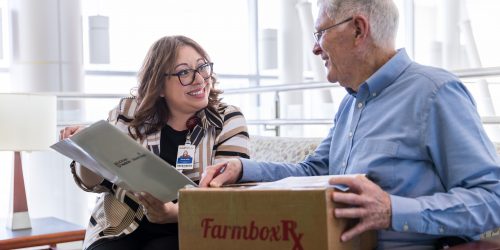
Esmeralda Castillo is a community health worker at UChicago Medicine AdventHealth. [PC: Eric Herzog]
When Esmeralda Castillo walked into the hospital room, the patient thought she was in for another lecture. What came next took her by surprise.
“I first met Esmeralda when I was going through alcohol detox,” says Susanna, 53, a patient at UChicago Medicine AdventHealth Hinsdale. “I was expecting the usual ‘You can go here; you can go there.’ Instead, she said, ‘What can I help you with?’”
It was that moment of servant leadership that Susanna remembered months later when she was trying to rebuild her life. She reached out to Castillo, a community health worker for UChicago Medicine AdventHealth. Ten months later, the two women are still working together as Susanna, who has maintained her sobriety, prepares to start a new job.
“I had a hard time going back to real life,” says Susanna, who asked that her last name not be used. “Esmeralda comes through with the things that are so difficult. Rides, nutrition; she’s been a post of strength for me.”
UChicago Medicine AdventHealth, a joint venture formed in 2023, is most readily identified by its four hospitals and more than 50 physician and outpatient clinics spread throughout four Chicago suburbs. But the organization understands that health care does not end at a hospital’s doors.
To help patients manage chronic health conditions when they return home, the health system started a health equity program 18 months ago. The program is designed to help give all community members equal opportunity to achieve optimal health.
The health equity team started with a focus on hospital inpatients. They analyzed patient records to find health conditions with outcomes that differed between groups of patients. Then they looked at factors that influenced those varying outcomes.
“It could be health conditions, health behaviors or social determinants of health,” says Fabiola Zavala, regional director of community health. Social determinants of health (SDOH) are non-medical factors that influence a person’s health, such as a person’s race or gender, where they live or whether they have insurance.
“Then we thought about what the hospital could do to work collaboratively with community partners to address those needs and have an impact.”
They selected two health conditions that fit these criteria: diabetes and alcohol, and substance-use disorders. The traditional approach at this point would be to create educational materials telling patients how to improve their health.
Zavala’s team took a different course, focusing on tackling the obstacles that were preventing patients from becoming healthier.
“I’ve been around this circle long enough to know what I need to do,” Susanna says. “I needed someone to say, ‘How can I help you get there?’… If I had to go to a class, she arranged it. When I have to go to the doctor, she has arranged it. She’s just been a great person to have around.”
Patients qualify for the program if they have diabetes or alcohol or substance-abuse disorder. They are then asked questions about factors such as whether they have access to healthy foods, transportation and places to exercise.
This program’s goals to improve health and decrease readmissions are integral to AdventHealth’s mission to Extend the Healing Ministry of Christ, Zavala says.
“Health equity work is so important because we want to make sure everyone has the opportunity to improve their health,” she says. “Identifying the needs that someone has and connecting them to the resources is a way of extending the healing ministry of Christ into our community.”
![As the regional director of community health at UChicago Medicine AdventHealth, Fabiola Zavala works collaboratively with community partners to help patients address their needs. [PC: Eric Herzog]](/build/image/14883.jpg?or=360&crop=%2C%2C%2C&w=480&h=480&s=e4da692c3e58fadf2f42a8a68a78098d)
In 2024, 142 patients qualified for the organization’s Health Equity Initiative, and 106 accepted Castillo’s one-on-one support to help connect them with resources. Castillo first looks for programs offered by UChicago Medicine AdventHealth, such as FarmboxRx.
The health system, with support from the W.K. Kellogg Foundation, uses FarmboxRx to deliver a box of fresh produce and healthy grocery items weekly to patients who lack access to healthy foods.
“I love fresh food, but because of my past actions, I’m not able to drive so I can’t jump in the car and go to Jewel (the local grocery chain),” says Susanna, who participates in the program and is working on stabilizing her blood sugar levels. “When I get fresh food, it’s a blessing.”
Castillo also uses the Whole Health Hub (wholehealthhub.org), a website resource used by AdventHealth, to find local community organizations to help support patients.
“There’s almost always some sort of program out there, but the patient may not know about it or how to get connected,” Castillo says. “I enjoy my role of being the bridge between patients, health care providers and social service providers.”
Once she’s found a program, Castillo helps patients by scheduling appointments, arranging transportation or asking one of her many contacts at these organizations to reach out to the patient. She has found community organizations to help patients with food, transportation, health education, outpatient health care services, job training, employment and more.
“Her role as a community health worker is to make sure that the patient is actually connecting,” Zavala says. “If there are any barriers, whether it's language or not being able to make that phone call, she's able to make that that warm hand-off with the community partner.”
Zavala and Castillo are also teaching hospital staff how to use Whole Health Hub. “We’re connectors,” Zavala says. “We’re making sure our staff knows about Whole Health Hub so that if they identify a patient with a need, they can easily look up a resource for them in their zip code.”

The health equity team is currently analyzing outcomes for the program’s first year, tracking measures such as the number and types of services that were provided, and self-reported measures such as increased consumption of fruits and vegetables or whether they still are food insecure. In the long term, the program hopes to see better glucose control for patients with diabetes, and improved rates of abstinence for patients with alcohol or substance dependency — both of which will reduce hospitalizations.
They also are tracking whole-person health measures, such as whether a patient’s mental or emotional health has improved, whether they have reforged family connections or whether they feel more connected to a purpose.
“Our goal is not only to help everyone improve their health, but to improve lives,” Zavala says.
Whole Health Hub (wholehealthhub.org) is a free, online database that allows users to find local community organizations that provide a wide range of resources such as financial assistance, food, transportation, home goods and medical care. Users can search the database by zip code and area of interest.
Michele Conklin is a writer for AdventHealth.